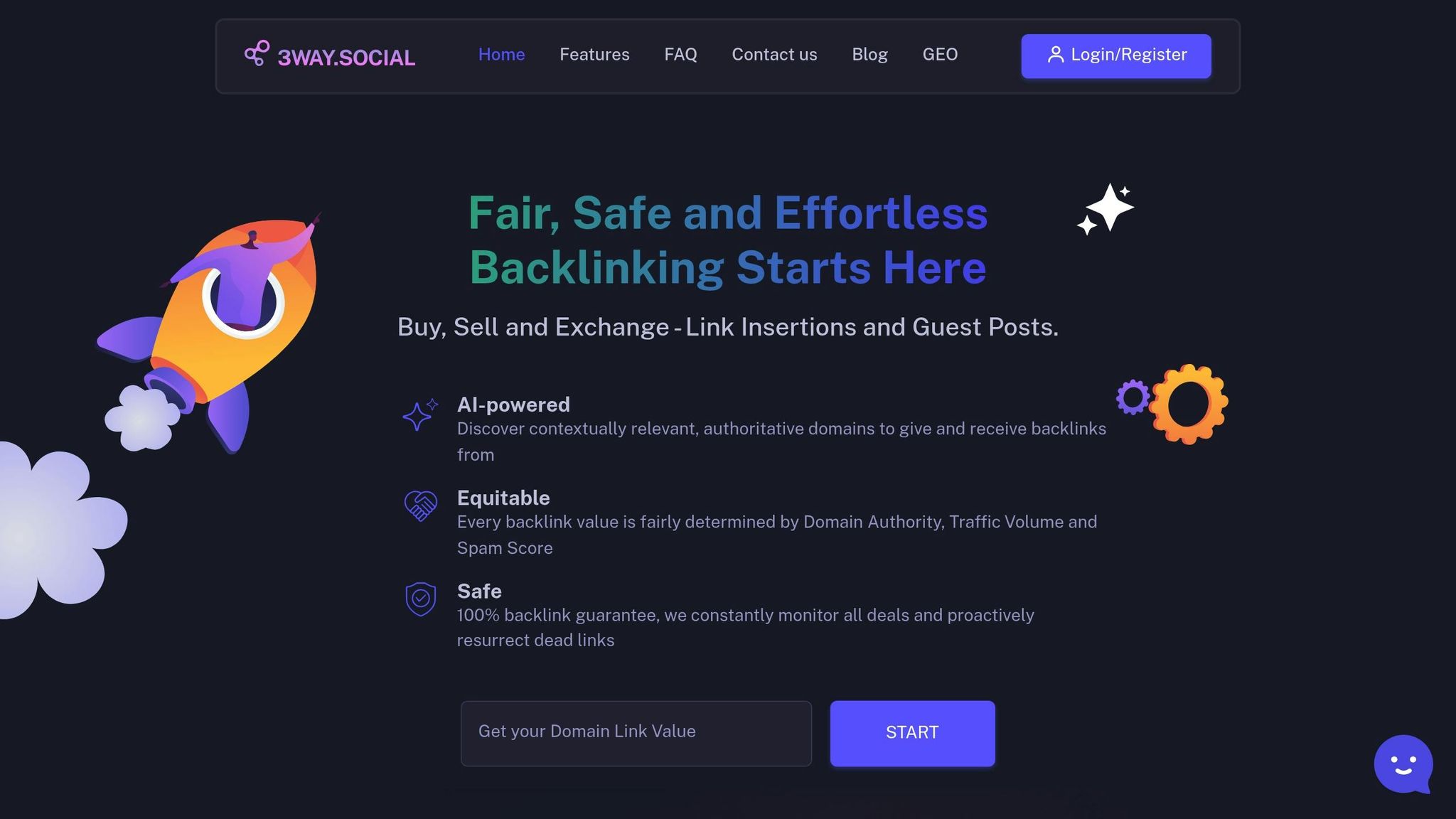Last Updated on August 16, 2025 by Becky Halls
Ethical link exchanges are a safe, long-term strategy for improving SEO. They focus on creating meaningful, relevant partnerships between websites, avoiding manipulative tactics that can lead to penalties. Here’s what you need to know:
- What it is: Ethical link exchanges involve sharing backlinks between websites in related fields to benefit both parties and their audiences.
- Why it matters: Search engines reward high-quality, relevant links while penalizing manipulative schemes. Ethical exchanges improve trust, rankings, and traffic.
- How to do it: Choose partners with strong domain authority, relevant content, and healthy traffic. Avoid link farms, spammy sites, and unnatural patterns.
- Tools to help: Platforms like 3Way.Social simplify the process by automating partner selection, monitoring, and compliance.
How to get FREE BACKLINKS With ABC Link Swaps
Finding Reliable Link Exchange Partners
The success of any ethical link exchange strategy depends heavily on choosing the right partners. Collaborating with reputable websites not only strengthens your SEO but also builds credibility. To get started, focus on evaluating the right metrics to identify quality partners.
Key Criteria for Evaluating Partners
When assessing potential link exchange partners, consider the following factors:
- Domain authority and trust metrics: These should be your starting point. Look for sites with steady growth in authority and trust over time. This indicates a healthy, reliable website.
- Content quality and relevance: The partner’s content should align with your industry or audience interests. For example, a fitness blog linking to a nutrition website makes sense, but linking to a payday loan site raises red flags. Ensure their content is well-written and resonates with your audience.
- Traffic patterns and engagement: Legitimate websites typically show consistent organic traffic, low bounce rates, and active social media engagement. Be cautious of sites with sudden traffic spikes or erratic patterns, as these may suggest manipulation.
- Link profile health: Review the site’s link profile separately from authority metrics. A strong profile shows diversity in links and avoids connections to spammy or low-quality websites. Their outbound links should point to reputable sources and steer clear of link schemes or private blog networks.
- Technical website health: A partner’s website should be user-friendly and SEO-ready. Look for fast loading times, mobile optimization, and SSL certificates. Frequent technical issues or downtime can negatively impact your SEO efforts.
Avoiding Black-Hat Practices
To protect your SEO, steer clear of unethical practices. Here’s what to watch for:
- Link farms and private blog networks: These setups often consist of multiple sites with thin content, similar designs, and excessive cross-linking. They prioritize keyword stuffing over real value, making them a serious risk.
- Suspicious outbound link patterns: Be wary of sites linking to unrelated industries, gambling platforms, adult content, or spam domains. For example, a cooking blog linking to random e-commerce sites may be involved in paid link schemes.
- Unnatural anchor text distribution: Legitimate websites use a mix of branded, generic, and partially matched keywords in their anchor texts. Overusing exact-match commercial keywords can indicate manipulative practices.
- Geographic and language inconsistencies: If a website claims to serve U.S. customers but is hosted in spam-prone regions or switches inconsistently between different forms of English, it could be a red flag.
- Aggressive outreach tactics: Be cautious of partners who push for immediate responses, promise guaranteed rankings, or pressure you into quick decisions. Ethical partners take the time to understand your goals and propose fair, mutually beneficial arrangements.
Now, let’s explore how AI tools can simplify and secure the process of finding trustworthy partners.
How 3Way.Social Supports Secure Partnerships

3Way.Social takes the guesswork out of partner selection with tools designed to streamline and safeguard link exchanges.
- AI-powered domain matching: This feature analyzes key factors like domain authority, content relevance, traffic trends, and link profile health to suggest ideal partners. It saves you from hours of manual research.
- Quality control filters: The platform continuously monitors partner websites, tracking changes in authority and flagging suspicious linking patterns. This ensures your partners meet high standards over time.
- Balanced value assessments: Instead of focusing solely on domain authority, 3Way.Social evaluates multiple metrics – such as page authority, content relevance, and traffic quality – to create fair partnerships that benefit everyone involved.
- Access to a vetted network: The platform connects you with pre-screened SEO professionals and website owners who follow ethical practices. This reduces the risk of working with low-quality or unscrupulous operators.
- Secure exchange framework: 3Way.Social supports three-way link arrangements, which appear more natural to search engines. This approach helps diversify your link profile and aligns with search engine preferences for organic backlink patterns.
Setting Up Ethical Link Exchanges
Once you’ve found trustworthy partners, the next step is to build exchanges that genuinely benefit everyone involved. Start by reaching out with clear, personalized communication, and ensure the exchanges feel natural while keeping the process well-organized.
Steps for Ethical Link Exchange Outreach
Kick off your outreach with messages tailored to the specific website you’re contacting. Take time to research their content, audience, and recent posts so your communication aligns with their goals. Avoid generic templates – customized messages show you’re serious about collaboration.
Make your value clear right away. Show how the exchange will specifically benefit their audience. For example, if you run an SEO tools website and you’re reaching out to a digital marketing blog, you might highlight how your content on technical SEO audits could help their readers improve their optimization strategies.
Transparency is key to building trust. Be upfront about your intention to establish a link exchange, and emphasize the mutual benefits. Avoid vague or misleading requests – professional partners appreciate honesty and are more likely to engage when you’re clear about your goals.
When suggesting links, focus on creating new, high-quality content where the links fit naturally. Instead of asking for links in existing articles, propose fresh content that adds value to their audience while seamlessly incorporating the links.
Timing and follow-ups matter. Give your contact at least a week to respond before sending a follow-up. If you don’t hear back after two polite reminders, it’s time to move on to other prospects. Striking the right balance between persistence and respect shows professionalism without being overbearing.
Next, let’s dive into how three-way link exchanges can help diversify your link profile in a natural way.
The Role of 3-Way (ABC) Link Exchanges
Simple reciprocal links can create patterns that search engines might penalize. Enter ABC link exchanges, where three websites are involved: Site A links to Site B, Site B links to Site C, and Site C links back to Site A. This triangular setup mimics organic linking patterns and looks more natural.
However, managing these exchanges manually can be tricky. Coordinating multiple partners, ensuring everyone follows through, and keeping communication running smoothly takes time and effort.
This is where 3Way.Social steps in. The platform automates the process, matching partners based on factors like domain authority, content relevance, and link value. It then handles the coordination for you, reducing the risk of incomplete exchanges and saving time.
3Way.Social also ensures fairness by analyzing multiple factors – not just domain authority. Metrics like page authority, traffic quality, and link placement are all considered to ensure that each party gets an equitable exchange. This prevents situations where one partner contributes significantly more than the others.
The platform also opens up opportunities for link diversification through its network of vetted partners. Instead of sticking to a few direct exchanges, you gain access to a broader range of quality websites across different industries. This variety strengthens your link profile and reduces reliance on any single partnership.
Once your exchanges are in place, staying on top of them is essential to maintain their value.
Tracking and Managing Link Exchanges
As your network of link exchanges grows, keeping everything organized and monitored becomes crucial. Links can go inactive due to site updates, redesigns, or policy changes. Without proper tracking, you might unknowingly continue linking to partners who no longer reciprocate, which could hurt your SEO efforts.
What should you monitor? Start with link status, anchor text variations, and the performance of the referring pages. Check monthly to ensure your links are active and correctly formatted. Also, keep an eye on the pages hosting your links to confirm they maintain good search engine visibility and haven’t been moved to less valuable sections like footers.
Maintain detailed records of all exchange agreements, including contact details, link placements, and agreed-upon ratios. This documentation helps you track performance, manage relationships, and identify trends over time.
3Way.Social simplifies this process by automating the monitoring of link statuses, anchor text, and performance metrics. The platform alerts you to broken or removed links and flags changes in the quality of partner sites. This means you can quickly address any issues before they impact your SEO.
Additionally, the platform tracks key SEO metrics, like changes in domain authority, organic traffic, and search rankings, to help you identify which exchanges are delivering the most value. This insight allows you to focus on building similar high-performing partnerships.
Don’t forget to regularly audit your backlink profile. Keeping an eye on link quality and relevance ensures your profile stays strong, aligns with search engine guidelines, and supports your long-term SEO goals.
sbb-itb-88880ed
Managing Risks and Ensuring Compliance
Once you’ve nailed down a solid partner selection and outreach plan, the next step is protecting your SEO efforts by managing risks. Even the most well-intentioned link exchanges come with potential pitfalls. Staying alert to these risks and ensuring compliance with search engine guidelines can save you from penalties while preserving the advantages of ethical link building. This makes careful oversight a must for any successful link exchange strategy.
Common Link Exchange Risks
One of the biggest risks is over-optimization. If you rely too much on exact-match anchor text or build links too quickly, search engines might detect unnatural patterns, which could hurt your rankings.
Another red flag is unnatural link patterns. For example, excessive reciprocal linking or using the same anchor text repeatedly can signal manipulative behavior. Similarly, if most of your backlinks come from similar areas on websites – like footers, sidebars, or "partners" pages – it could look like an artificial linking scheme.
Participating in link schemes or networks is especially risky. These arrangements often involve groups of websites linking to each other in orchestrated ways. Google’s Webmaster Guidelines specifically caution against "excessive link exchanges" and "partner pages exclusively for cross-linking", both of which can harm your rankings.
Getting caught in manipulative link exchanges can lead to ranking drops or manual actions from Google. If this happens, recovery can be a long and grueling process involving tasks like disavowing bad links and rebuilding your backlink profile from scratch.
Regular Audits and Monitoring
Regular backlink audits are your best defense against potential issues. Aim to conduct these audits monthly to check link status, anchor text diversity, and overall link quality.
Start by looking for sudden spikes in backlinks, which could indicate spammy or automated link building. Keep an eye out for overuse of exact-match anchor text and links from low-quality or irrelevant sites that could damage your site’s credibility.
Tools like Ahrefs, Moz, and SEMrush can simplify the audit process. These platforms can help you spot toxic or irrelevant links, such as multiple links from the same IP address or links from websites with questionable content. It’s also important to check whether your partners are holding up their end of the exchange.
Document your findings thoroughly. Maintaining records of disavowed links, terminated partnerships, and new opportunities can be invaluable if you ever need to address ranking issues or demonstrate compliance.
Platforms like 3Way.Social can automate much of this monitoring. It continuously tracks link statuses and partner site quality, alerting you to broken links, changes in partner authority, or compliance issues before they escalate. This reduces manual effort and helps you maintain a strong link profile.
Audits are also a great way to identify your most valuable partnerships. By tracking which exchanges drive the most traffic and boost rankings, you can focus on nurturing similar high-quality relationships. This ongoing evaluation separates ethical link building from risky shortcuts.
Comparison of Ethical vs. Unethical Practices
To stay compliant with search engine guidelines, it’s crucial to understand the difference between ethical and unethical link exchanges. The distinction often boils down to intent, execution, and sustainability.
| Aspect | Ethical Link Exchanges | Unethical Link Exchanges |
|---|---|---|
| Intent | Add value and relevance for users | Manipulate rankings with artificial links |
| Process | Manual, relationship-driven, content-focused | Automated, mass, or irrelevant exchanges |
| Link Quality | High-quality, relevant, authoritative sites | Low-quality, unrelated, spammy sites |
| Risk | Low risk of penalties; long-term benefits | High risk of penalties and ranking drops |
| Guideline Adherence | Follows Google’s guidelines | Violates Google’s guidelines |
| Monitoring | Ongoing audits and relationship management | Minimal oversight; "set-it-and-forget-it" |
Ethical link exchanges focus on quality over quantity, forming partnerships with reputable sites that genuinely enhance the user experience. On the flip side, unethical practices treat link building as a numbers game, often relying on automated tools, irrelevant sites, and low-value placements. These shortcuts not only violate Google’s rules but also lead to unstable SEO results.
The approach to monitoring also sets ethical practices apart. Ethical link builders maintain active relationships with their partners to ensure the exchanges remain beneficial and compliant, while unethical practitioners often neglect this step entirely.
A website that engaged in widespread reciprocal linking with unrelated sites faced a manual penalty from Google. To recover, the team had to disavow harmful links, remove unnatural reciprocal links, and adopt a more sustainable strategy centered on high-quality guest posts and relationship-based link building. After months of effort, the site’s rankings and traffic gradually improved as its backlink profile became more natural and compliant.
This example highlights how unethical practices can backfire and why prevention through ethical strategies is always the smarter choice. Staying informed about Google’s guidelines and algorithm updates is essential for maintaining compliance. Search engines are constantly improving their ability to detect manipulative tactics, making ethical link building not just the right approach but the only one that delivers lasting results. Proactively managing risks ensures your link exchange strategy stays effective and aligned with search engine requirements.
Using AI Platforms for Ethical Link Building
AI-powered platforms are changing the game for ethical link building. They automate tasks like partner vetting, monitoring, and compliance, shifting the process from reactive to proactive. The result? A more efficient way to build strong, trustworthy backlink profiles.
Benefits of AI-Powered Link Exchange Platforms
AI platforms take ethical link building to the next level by refining how partners are selected and monitored. One standout feature is automated domain matching, which quickly identifies contextually relevant, high-authority domains. Instead of spending hours manually researching potential partners, AI can analyze thousands of sites in minutes, assessing factors like domain authority, content relevance, and spam scores.
Another big advantage is risk reduction. AI platforms use historical data to predict potential issues, flagging low-quality or spammy domains before you engage with them. This predictive analysis provides real-time risk insights and automated scoring, cutting vetting time from days to just minutes.
Additionally, continuous monitoring ensures that any changes in a partner’s performance are flagged immediately. Real-time alerts help you stay ahead of potential risks, so you can address problems before they escalate.
Key Features of 3Way.Social
A great example of AI-driven ethical link building is 3Way.Social, a platform designed to simplify and elevate the process. With over 10,000 successful link exchanges under its belt, users have reported an average 20% traffic boost and rankings that improve three times faster compared to traditional methods.
The platform’s AI-powered discovery system scans for relevant and authoritative domains, ensuring link placements are both natural and ethical. One standout feature is its permanent do-follow link guarantee, which includes proactive monitoring to resurrect dead links – a common frustration in traditional link building.
To ensure fair exchanges, 3Way.Social uses a unified SEO score based on factors like Domain Authority, Traffic Volume, and Spam Score. Its innovative ABC (three-way) link strategy has been a game-changer, with users seeing an average 30% increase in Domain Authority after using the platform.
"3Way.Social revolutionized our SEO approach. Our site’s rankings have significantly improved thanks to its innovative ABC link exchange system. The platform’s high-quality partner network is unmatched."
- Sophia Martinez, SEO Manager
These features not only improve link quality but also save time, making the entire process smoother and more effective.
Reducing Manual Work and Human Error
One of the biggest advantages of AI platforms is their ability to reduce manual workloads and minimize human error. Tasks like partner evaluation and follow-up management are automated, freeing up SEO professionals to focus on strategy and relationship building. By centralizing workspaces, standardizing data formats, and organizing content, these platforms eliminate workflow interruptions and ensure smooth operations.
AI also enhances fraud detection, spotting subtle patterns and anomalies that might slip past human analysts. This helps identify manipulative link schemes or fake sites early on. Automated monitoring keeps an eye on key risk indicators, ensuring compliance and addressing issues as they arise.
For added security, features like role-based access controls protect sensitive data and ensure compliance. By automating time-consuming tasks, AI platforms allow you to focus on the bigger picture – building ethical, effective link strategies that deliver results.
"This platform has been a lifesaver for my link-building campaigns. The user-friendly dashboard and smart exchange options significantly reduce manual time, and the precise partner selection based on SEO metrics is a major plus."
- Alex Chen, Freelance SEO Consultant
Building Ethical and Long-Term Backlink Profiles
Creating a backlink profile that stands the test of time means focusing on strategies that remain effective, even as search engine algorithms evolve. Ethical link-building practices lead to steady SEO growth, while manipulative tactics can result in penalties. Let’s dive into some actionable insights for building a strong, sustainable backlink profile.
Key Takeaways
- Focus on quality, not quantity: Building meaningful relationships with authoritative and relevant partners ensures your backlink profile can withstand algorithm updates.
- Vet potential partners carefully: Tools like Ahrefs, Moz, or SEMrush can help you evaluate a site’s content quality, user engagement, and reputation in the industry. A single unreliable partner can undo months of effort.
- Incorporate links naturally: Links embedded in high-quality content, such as guest posts or resource pages, are far more effective than those on dedicated link exchange pages. Links that genuinely add value for readers are more likely to meet Google’s standards and deliver long-term benefits.
- Monitor consistently: Regularly auditing your backlink profile helps identify broken links, changes in partner quality, or potential issues. Staying proactive ensures compliance with Google’s guidelines and safeguards your rankings.
- Leverage ABC link exchanges: This approach creates a natural link pattern that minimizes the risk of penalties, making it a safer option for long-term SEO strategies.
Next Steps for Ethical Link Building
To strengthen your backlink profile while staying within ethical boundaries, consider these steps:
- Conduct a thorough audit: Before pursuing new links, review your existing profile to identify and remove any risky or low-quality links.
- Utilize AI-powered tools: Platforms like 3Way.Social can streamline ethical link-building efforts. With features like a vetted network of SEO professionals, automated partner matching, and a reliable ABC link exchange system, this tool helps reduce manual work while ensuring compliance. The platform also guarantees permanent do-follow links, adding an extra layer of security to your strategy.
- Build authentic industry connections: Engaging with your industry through valuable content and active participation in communities often leads to the most meaningful and sustainable link opportunities.
- Set realistic expectations: Ethical link-building takes time. While it may not deliver quick wins, the results are more stable and enduring. Aim for consistent, gradual growth rather than chasing rapid, short-term gains.
It’s important to note that reciprocal linking isn’t inherently against Google’s guidelines. The key is moderation – avoid excessive or manipulative exchanges. By staying within these limits, you can create a backlink profile that supports your SEO goals for the long haul.
FAQs
How can I choose trustworthy link exchange partners to protect my SEO performance?
To make sure your link exchange partners are reliable and won’t hurt your SEO, start by checking their domain authority, content relevance, and trustworthiness. Focus on websites that fit your niche and have a solid reputation backed by quality backlinks. Stay away from sites that seem spammy or rely on low-quality links – they can drag down your rankings.
Leverage tools to assess metrics like domain authority and backlink quality. Keep the lines of communication open with your partners to ensure ethical practices and consistent standards. By choosing reputable partners, you’ll create a stronger and more lasting SEO strategy.
What risks come with unethical link exchanges, and how can they impact my website’s SEO rankings?
Unethical link exchanges can wreak havoc on your website’s SEO. Search engines like Google are constantly on the lookout for manipulative tactics, and if caught, your site could face penalties like lower rankings – or worse, complete removal from search results. These consequences can lead to a sharp drop in traffic, reduced visibility, and a hit to your site’s credibility.
The best way to safeguard your site is to stick to ethical link-building practices that follow search engine guidelines. Focus on earning high-quality, relevant backlinks from trusted sources to create a strong and lasting SEO strategy.
What makes the ABC (three-way) link exchange strategy more effective and natural than traditional reciprocal linking?
The ABC (three-way) link exchange strategy is a clever way to boost your website’s backlink profile by involving three separate websites instead of a straightforward link swap between two. This approach creates a more natural and varied backlink network, making it less likely to raise red flags with search engines for manipulative practices.
By distributing links across multiple sites, this strategy increases link variety and enhances the flow of authority, both of which play a key role in improving SEO results. Plus, it stays in line with search engine rules, helping you avoid penalties while building better rankings and trustworthiness.



